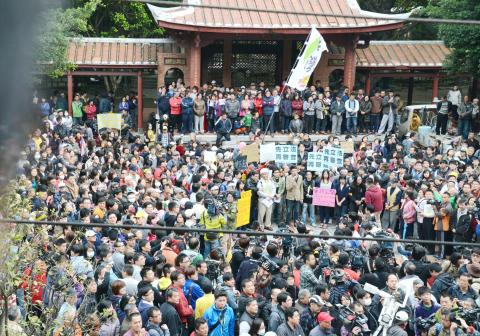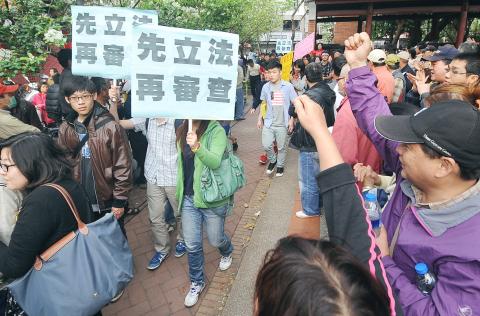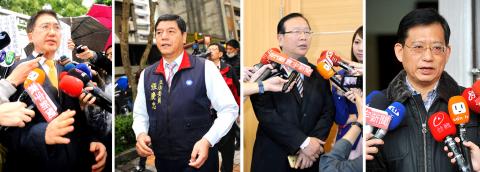Hundreds of students and other activists yesterday marched through the streets of Banciao (板橋) in New Taipei City calling for the recall of the Chinese Nationalist Party’s (KMT) “four major bandits.”
The “four bandits” refer to four KMT lawmakers who the protesters believe have been following President Ma Ying-jeou’s (馬英九) orders without hesitation — including KMT Central Policy Committee chief executive Lin Hung-chih (林鴻池), whose constituency is in Banciao.
Student leaders Lin Fei-fan (林飛帆) and Chen Wei-ting (陳為廷) announced yesterday morning that one of them would lead a group of people to Banciao to call on the electorate to exert pressure on Lin and ask him to listen to the people instead of Ma, who doubles as KMT chairman.

Photo: CNA
About 20 student representatives, including members of student group Democracy Kuroshio, nongovernmental organization workers and academics, gathered in Banciao at 2:30pm and were subsequently joined by hundreds of people.
Neither Lin Fei-fan nor Chen showed up, with the former saying from the legislative floor — which protesters have been occupying since March 18 — that they decided against going to avoid drawing media attention to them, which could have obscured the aim of the movement.
Chanting “Reject Ma’s will and respect the people’s will,” “Lin Hung-chih come out and face us” and “Recall Lin Hung-chih,” more than 500 people gathered in a park and marched through several streets before returning to the park to deliver short speeches.

Photo: Liao Chen-huei, Taipei Times
At about 5pm, police, holding up a board that read: “[Your] behavior has violated the law,” told the crowd that the gathering was in violation of the Assembly and Parade Act (集會遊行法).
Students retorted that they were just “passing by” — a reference to how Taipei police had described former gang leader Chang An-le’s (張安樂) demonstration on Tuesday.
Commenting on the protest, Lin Hung-chih said he had done nothing wrong in reviewing the cross-strait service trade agreement.

Photo: Taipei Times
He added that he was willing to apologize for the “social instability” caused by the “30-second incident and the students’ subsequent occupation” of the legislature.
He was referring to a move by KMT Legislator Chang Ching-chung (張慶忠) to pass the service trade agreement through a legislative committee meeting in 30 seconds.
Chang, the second of the so-called “four bandits,” called on everybody to calm down and to quickly put an end to the protests.
KMT Legislator Wu Yu-sheng (吳育昇), the third recall target, criticized the students, saying they represent no one and have no right to ask elected lawmakers to step down.
He compared the students’ action to police being censured by robbers and said they are behaving like “red guards.”
KMT Legislator Lin Te-fu (林德福), the last of the four, said the students had “gone overboard.”
In other developments, the student protesters yesterday proposed a “civil parliament,” saying they would implement what they described as “direct democracy” to review draft legislation to establish a mechanism to monitor cross-strait agreements in the legislature.
The meetings are to start today, with more than 1,500 people from 60 groups expected to attend, Lin Fei-fan said.
Lawmakers across party lines are welcome to join, he said, as he encouraged more KMT lawmakers to “stand with the people and respond to the students’ demands.”
Additional reporting by CNA

SECURITY: As China is ‘reshaping’ Hong Kong’s population, Taiwan must raise the eligibility threshold for applications from Hong Kongers, Chiu Chui-cheng said When Hong Kong and Macau citizens apply for residency in Taiwan, it would be under a new category that includes a “national security observation period,” Mainland Affairs Council (MAC) Minister Chiu Chui-cheng (邱垂正) said yesterday. President William Lai (賴清德) on March 13 announced 17 strategies to counter China’s aggression toward Taiwan, including incorporating national security considerations into the review process for residency applications from Hong Kong and Macau citizens. The situation in Hong Kong is constantly changing, Chiu said to media yesterday on the sidelines of the Taipei Technology Run hosted by the Taipei Neihu Technology Park Development Association. With

CARROT AND STICK: While unrelenting in its military threats, China attracted nearly 40,000 Taiwanese to over 400 business events last year Nearly 40,000 Taiwanese last year joined industry events in China, such as conferences and trade fairs, supported by the Chinese government, a study showed yesterday, as Beijing ramps up a charm offensive toward Taipei alongside military pressure. China has long taken a carrot-and-stick approach to Taiwan, threatening it with the prospect of military action while reaching out to those it believes are amenable to Beijing’s point of view. Taiwanese security officials are wary of what they see as Beijing’s influence campaigns to sway public opinion after Taipei and Beijing gradually resumed travel links halted by the COVID-19 pandemic, but the scale of

A US Marine Corps regiment equipped with Naval Strike Missiles (NSM) is set to participate in the upcoming Balikatan 25 exercise in the Luzon Strait, marking the system’s first-ever deployment in the Philippines. US and Philippine officials have separately confirmed that the Navy Marine Expeditionary Ship Interdiction System (NMESIS) — the mobile launch platform for the Naval Strike Missile — would take part in the joint exercise. The missiles are being deployed to “a strategic first island chain chokepoint” in the waters between Taiwan proper and the Philippines, US-based Naval News reported. “The Luzon Strait and Bashi Channel represent a critical access

Pope Francis is be laid to rest on Saturday after lying in state for three days in St Peter’s Basilica, where the faithful are expected to flock to pay their respects to history’s first Latin American pontiff. The cardinals met yesterday in the Vatican’s synod hall to chart the next steps before a conclave begins to choose Francis’ successor, as condolences poured in from around the world. According to current norms, the conclave must begin between May 5 and 10. The cardinals set the funeral for Saturday at 10am in St Peter’s Square, to be celebrated by the dean of the College